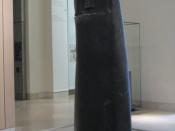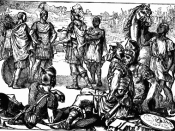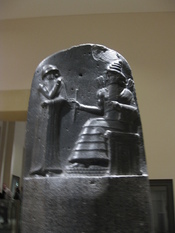Warfare, like everything else in the City of the Sun, is a communal event. There is the division of leaders, with Power as the head and similarly leaders of smaller factions, such as the infantry, artillery, cavalry, and engineers. Those 12 and older, both boys and girls, are taught to fight in a variety of ways, with many weapons. Here again, like in the beginning Campanella shows the importance of have a vast knowledge of almost everything from all of the animals on the outer walls, to the ability to use a wide selection of weapons.
The city continually reviews their military progress every two months, and studies the lessons history has provided them, the likes of Caesar, Alexander, Scipio, and Hannibal. To have knowledge of arms and wars is one thing, but to continually practice allows the abilities to remain sharp, thus the city shuns indolence and must always be prepared for the unexpected.
Before going to war they pray and hold a council discussing the next likely steps to take. The enemies are given the opportunity to forfeit, but if the offer isn't heeded then war is seemingly the only foregone conclusion. Following an official decree of battle, all those fighting in the battle, aged 20 and older, again both men and women, hear the justice of their cause proclaimed by the Orator, invoking an heir of heroism and sole duty to the city, the foremost important thing in their lives.
When the battle is over, which they presumably won, the heralded warriors are comforted by women and children. Many prayers of thanks and banquets follow similar to a Roman style, although to a much greater extent.
The conquered city then changes over to same structure of living that the Solarians use, communal ownership of all goods. The tear down all enemy fortifications, slay the leaders, or do other injury to the vanquished, all in one day, so that thereafter they are able to show the kindness and communal relationship that all Solarians deserve. Campanella explains wars thus by stating: "They (the Solarians) affirm that war shoud never be undertaken except to make men good, not to destroy them." (an extremely altruistic ideal) Justice In the judicial system each individual was judged by the chief of his craft, who held the right to punish, by means of banishment, flogging, censure, withdrawing the right of common mess, attendance of church, or conversing with women. If a serious premeditated injury was committed, the "law of retaliation" was implied. This was an eye for an eye ideal, coming from the code of Hammurabi. If the injury was unpremeditated violence, the sentence was mitigated by the accused and accuser before the judge and Power. The decision was made shortly after on the same day, and if repealed, Power would hand down a second opinion, and then Sun if need be had the final say.
One of his few chances to live was by appealing to the masses. Because it was a communal effort to kill the convicted, by either stoning or burning, it could also be in their favor to pardon him. If the convicted was executed, afterwards there would be many prayers to God, to allay His wrath, seeing the necessity to remove the infected limb from the body.
Before going to execution he has to state why he shouldn't be killed and also enumerate the sins committed by others, even leaders of the state, and show why they deserve a worse sentence than his own. This was probably included in the text due to his many years of imprisonment, and he saw these ways probably as a means of escape.
Faults of a lesser demeanor, due to either weakness or ignorance are punished but also either taught to control themselves or "master the craft" in which they showed ignorance. However repentance of one's own wrongdoings before another brings the charges against him absolves his guilt.





